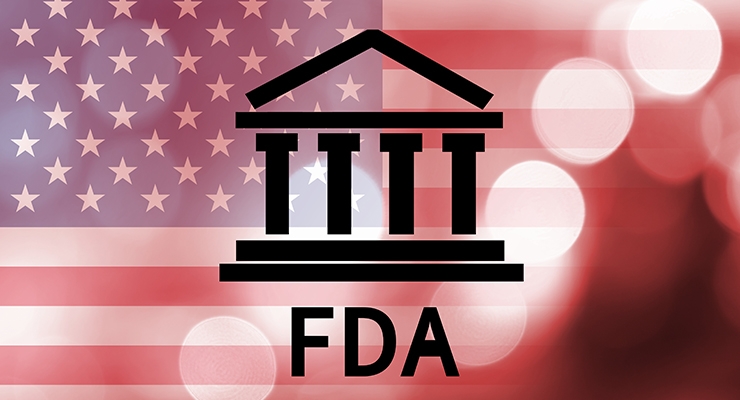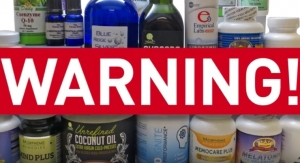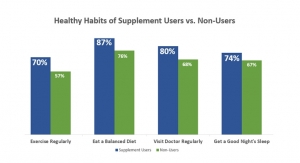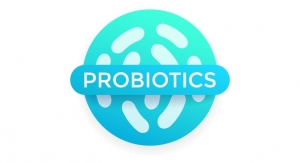By Sean Moloughney, Editor02.12.19
The U.S. Food and Drug Administration will embark on a plan to implement “one of the most significant modernizations of dietary supplement regulation and oversight in more than 25 years,” according to FDA Commissioner Scott Gottlieb, MD, who laid out the agency’s goals and priorities in a statement on Feb. 11.
Gottlieb noted significant industry growth since the passage of the landmark Dietary Supplement Health and Education Act (DSHEA) of 1994, which established the industry’s current regulatory framework.
“I’m concerned that changes in the supplement market may have outpaced the evolution of our own policies and our capacity to manage emerging risks,” Gottlieb said. “To continue to fulfill our public health obligations we need to modernize and strengthen our overall approach to these products.”
At the same time the agency announced it sent 12 warning letters and five online advisory letters to companies whose products—many of which are marketed as dietary supplements—are being sold illegally as unapproved new drugs because they make unproven claims to prevent, treat, or cure Alzheimer’s disease or other diseases and conditions like diabetes and cancer.
Agency Goals, Priorities & Potential Actions
Gottlieb noted the agency’s top priorities for dietary supplements include ensuring safety; maintaining product integrity (confirming that supplements contain what the label claims and that products are manufactured according to quality standards); as well as ensuring that consumers and healthcare professionals are able to make informed decisions before recommending, purchasing, or using dietary supplements.
Among the steps the agency is considering or actively formulating, include:
1) Establish new ways to communicate concerns that an ingredient is unlawful and potentially dangerous. “We’re developing a new rapid-response tool to alert the public so consumers can avoid buying or using products with that ingredient, and to notify responsible industry participants to avoid making or selling them,” Gottlieb said.
2) The agency’s regulatory framework must be flexible enough to evaluate product safety adequately while promoting innovation. “The key to this effort will be important steps to foster the submission of new dietary ingredient (NDI) notifications,” he said. “An effective NDI notification process represents the FDA’s only opportunity to evaluate the safety of a new ingredient before it becomes available to consumers and helps promote transparency and risk-based allocation of resources. We’re continuing to develop guidance for preparing NDI notifications to ensure FDA can thoroughly review the safety of these ingredients. In conjunction with this effort, we’re planning to update our compliance policy regarding NDIs.”
The agency is planning a public meeting this spring on the topic of responsible innovation in the dietary supplement industry. Other challenges that may act as barriers to dietary supplement innovation and safety include what the right incentives might be for establishing dietary supplement exclusivity, and the scope of permitted dietary ingredients.
“We invite all our stakeholders to share their views on how the FDA should strengthen the dietary supplement program for the future. So, please stay tuned for more information regarding registration and logistics,” Gottlieb said.
3) Work closely with industry partners to protect public health and safety. As industry develops new products, ingredients, delivery systems, etc., Gottlieb said FDA must do more to leverage its resources and authorities to evaluate these products. “This requires collaborative research and a shared understanding. I’m pleased to announce that we’ve recently created the Botanical Safety Consortium, a public-private partnership that will gather leading scientific minds from industry, academia and government to promote scientific advances in evaluating the safety of botanical ingredients and mixtures in dietary supplements. This group will look at novel ways to use cutting-edge toxicology tools, including alternatives to animal testing, to promote the goals of safety and effectiveness we share with consumers and other stakeholders.”
4) Continue taking actions to protect public health and develop new enforcement strategies. “We’re already making our internal processes more efficient for taking enforcement action when products claiming to be supplements contain unlawful ingredients, including drug ingredients,” said Gottlieb.
5) Engage in a public dialogue about whether additional steps to modernize DSHEA are necessary. “We’ve heard from stakeholders who want to open such a dialogue,” Gottlieb noted. “While the FDA is committed to leveraging its existing resources and authorities to the fullest extent possible, we believe there may be value in a broader public conversation about whether certain changes to the law might be helpful. We believe there may be opportunities to modernize DSHEA for the future, while preserving the law’s essential balance.”
For example, he noted some stakeholders have suggested establishing avenues for dietary supplement exclusivity and adding a product listing requirement, effectively improving transparency in the marketplace and promoting risk-based regulation. “It could also help facilitate efficient enforcement of the law and establish new mechanisms to identify bad actors who put the public at risk and undermine consumer confidence in the entire industry.”
The agency will be sharing additional details in the coming months about steps to implement these priorities.
The Balancing Act
Looking at the big picture, Gottlieb expressed his belief that supplements have a role to play in supporting health, and acknowledged the agency must balance access to safe products from responsible companies while protecting consumers from dangerous and illegal products masquerading as supplements.
“I’ve personally benefited from the use of dietary supplements and, as a physician, recognize the benefits of certain supplements as a part of a comprehensive care plan. It’s clear to me that dietary supplements play an important role in our lives as we strive to stay healthy. It’s also clear that the U.S. Food and Drug Administration plays an important role in helping consumers make use of safe, high-quality dietary supplements while also protecting Americans from the potential dangers of products that don’t meet the agency’s standards for marketing.”
Toward that end, the agency sent 12 warning letters and five online advisory letters to companies whose products are being sold illegally as unapproved new drugs because they make unproven claims to prevent, treat, or cure Alzheimer’s disease or other diseases and conditions like diabetes and cancer.
“Such claims can harm patients by discouraging them from seeking FDA-approved medical products that have been demonstrated to be safe and effective for these medical conditions,” said Gottlieb. “In recent years, we’ve also taken action against companies and dietary supplements making similar claims regarding treatment of serious conditions such as cancer and opioid addiction. These enforcement actions are just one part of our overall efforts to update our policy framework governing dietary supplements.”
In December of last year FDA established a Dietary Supplement Working Group comprised of representatives from multiple centers and offices across the agency. The group is tasked with evaluating organizational structures, processes, procedures, and practices in order to identify opportunities to modernize oversight of dietary supplements.
Industry Response
Steve Mister, president and CEO of the Council for Responsible Nutrition (CRN), said the association appreciates Gottlieb’s commitment to strengthen the dietary supplement industry and to modernize FDA’s oversight. “He clearly shares our respect, both as a doctor and as a consumer, for the power of dietary supplements to improve the lives and health of all Americans, three-quarters of whom already take our products each year. His statement shares our vision to further develop the thriving, innovative and safe marketplace for dietary supplements that, as he so eloquently states, play an important role as ‘we strive to stay healthy,’ and have ‘become a routine part of the American lifestyle.’”
Mister also applauded the commissioner’s enthusiasm for rooting out bad actors who put consumers at risk, and commended enforcement actions to address this problem. “In conjunction with numerous innovative industry initiatives, CRN regularly calls out bad actors, bad ingredients, and bad products masquerading as dietary supplements. We welcome additional enforcement actions to bring to justice those who would cynically trade on the halo effect of responsible industry to make a quick buck while ignoring the safety and health of consumers.”
He also called on Congress to appropriate adequate funds for FDA and other federal agencies to follow through on tough law enforcement.
Additionally, CRN urged FDA to consider several matters, including:
In a memo to membership, United Natural Products Alliance (UNPA) President Loren Israelsen noted the FDA announcement falls on the 25th anniversary of DSHEA. “We recognize that the world has changed. We will work closely with FDA on each of the stated objectives and the new ideas they propose, and to participate actively in the dietary supplement working group, once that becomes more public, as well as the Botanical Safety Consortium. The prospect of amendments to DSHEA has long been discussed as a non-starter. We, of course, will listen closely to FDA's ideas regarding DSHEA amendments and will work in close consultation with our members to that end.”
American Herbal Products Association (AHPA) President Michael McGuffin said AHPA shares the agency’s vision of “finding the right balance between preserving consumers’ access to lawful supplements, while also protecting the public from unsafe and unlawful products and holding accountable companies that are not in compliance with the law. AHPA has previously communicated specific suggestions for regulatory improvements to FDA and we look forward to a robust and transparent discussion on how best to serve Americans who include supplement products in their families’ healthcare choices.
“AHPA has invested significant resources to assist industry in submitting NDI notifications that meet the statutory requirements to bring a new ingredient to market,” he continued. “We have also submitted thoughtful comments to FDA’s prior draft NDI guidance documents and will continue to provide input so that any eventual guidance is both useful to the trade and does not stray from FDA’s statutory authority.”
AHPA’s Board of Trustees adopted a policy last November stating the current regulatory framework for supplements supports industry and consumers while providing FDA with adequate authority to regulate lawful products; and that regulations don’t need to be revised to mandate premarket registration or notification, McGuffin noted.
“Any reconsideration of this position on a dietary supplement product listing regime would depend on whether the legislative package also includes provisions that appropriately reduce burdens on the industry or create new opportunities for it and the consumers it serves, for example in the context of nutrient content claims,” McGuffin said.
Daniel Fabricant, PhD, president and CEO of the Natural Products Association (NPA), said the association looks forward to working with FDA on modernization, “but what consumers need is action. We encourage the FDA to use the current tools it has at its disposal to protect consumers from companies selling illegal products masquerading as nutritional supplements. The U.S. has the safest nutritional supplements in the world because of collaborative efforts between our industry and federal regulators, and we are confident that collaboration will continue.”
Gottlieb noted significant industry growth since the passage of the landmark Dietary Supplement Health and Education Act (DSHEA) of 1994, which established the industry’s current regulatory framework.
“I’m concerned that changes in the supplement market may have outpaced the evolution of our own policies and our capacity to manage emerging risks,” Gottlieb said. “To continue to fulfill our public health obligations we need to modernize and strengthen our overall approach to these products.”
At the same time the agency announced it sent 12 warning letters and five online advisory letters to companies whose products—many of which are marketed as dietary supplements—are being sold illegally as unapproved new drugs because they make unproven claims to prevent, treat, or cure Alzheimer’s disease or other diseases and conditions like diabetes and cancer.
Agency Goals, Priorities & Potential Actions
Gottlieb noted the agency’s top priorities for dietary supplements include ensuring safety; maintaining product integrity (confirming that supplements contain what the label claims and that products are manufactured according to quality standards); as well as ensuring that consumers and healthcare professionals are able to make informed decisions before recommending, purchasing, or using dietary supplements.
Among the steps the agency is considering or actively formulating, include:
1) Establish new ways to communicate concerns that an ingredient is unlawful and potentially dangerous. “We’re developing a new rapid-response tool to alert the public so consumers can avoid buying or using products with that ingredient, and to notify responsible industry participants to avoid making or selling them,” Gottlieb said.
2) The agency’s regulatory framework must be flexible enough to evaluate product safety adequately while promoting innovation. “The key to this effort will be important steps to foster the submission of new dietary ingredient (NDI) notifications,” he said. “An effective NDI notification process represents the FDA’s only opportunity to evaluate the safety of a new ingredient before it becomes available to consumers and helps promote transparency and risk-based allocation of resources. We’re continuing to develop guidance for preparing NDI notifications to ensure FDA can thoroughly review the safety of these ingredients. In conjunction with this effort, we’re planning to update our compliance policy regarding NDIs.”
The agency is planning a public meeting this spring on the topic of responsible innovation in the dietary supplement industry. Other challenges that may act as barriers to dietary supplement innovation and safety include what the right incentives might be for establishing dietary supplement exclusivity, and the scope of permitted dietary ingredients.
“We invite all our stakeholders to share their views on how the FDA should strengthen the dietary supplement program for the future. So, please stay tuned for more information regarding registration and logistics,” Gottlieb said.
3) Work closely with industry partners to protect public health and safety. As industry develops new products, ingredients, delivery systems, etc., Gottlieb said FDA must do more to leverage its resources and authorities to evaluate these products. “This requires collaborative research and a shared understanding. I’m pleased to announce that we’ve recently created the Botanical Safety Consortium, a public-private partnership that will gather leading scientific minds from industry, academia and government to promote scientific advances in evaluating the safety of botanical ingredients and mixtures in dietary supplements. This group will look at novel ways to use cutting-edge toxicology tools, including alternatives to animal testing, to promote the goals of safety and effectiveness we share with consumers and other stakeholders.”
4) Continue taking actions to protect public health and develop new enforcement strategies. “We’re already making our internal processes more efficient for taking enforcement action when products claiming to be supplements contain unlawful ingredients, including drug ingredients,” said Gottlieb.
5) Engage in a public dialogue about whether additional steps to modernize DSHEA are necessary. “We’ve heard from stakeholders who want to open such a dialogue,” Gottlieb noted. “While the FDA is committed to leveraging its existing resources and authorities to the fullest extent possible, we believe there may be value in a broader public conversation about whether certain changes to the law might be helpful. We believe there may be opportunities to modernize DSHEA for the future, while preserving the law’s essential balance.”
For example, he noted some stakeholders have suggested establishing avenues for dietary supplement exclusivity and adding a product listing requirement, effectively improving transparency in the marketplace and promoting risk-based regulation. “It could also help facilitate efficient enforcement of the law and establish new mechanisms to identify bad actors who put the public at risk and undermine consumer confidence in the entire industry.”
The agency will be sharing additional details in the coming months about steps to implement these priorities.
The Balancing Act
Looking at the big picture, Gottlieb expressed his belief that supplements have a role to play in supporting health, and acknowledged the agency must balance access to safe products from responsible companies while protecting consumers from dangerous and illegal products masquerading as supplements.
“I’ve personally benefited from the use of dietary supplements and, as a physician, recognize the benefits of certain supplements as a part of a comprehensive care plan. It’s clear to me that dietary supplements play an important role in our lives as we strive to stay healthy. It’s also clear that the U.S. Food and Drug Administration plays an important role in helping consumers make use of safe, high-quality dietary supplements while also protecting Americans from the potential dangers of products that don’t meet the agency’s standards for marketing.”
Toward that end, the agency sent 12 warning letters and five online advisory letters to companies whose products are being sold illegally as unapproved new drugs because they make unproven claims to prevent, treat, or cure Alzheimer’s disease or other diseases and conditions like diabetes and cancer.
“Such claims can harm patients by discouraging them from seeking FDA-approved medical products that have been demonstrated to be safe and effective for these medical conditions,” said Gottlieb. “In recent years, we’ve also taken action against companies and dietary supplements making similar claims regarding treatment of serious conditions such as cancer and opioid addiction. These enforcement actions are just one part of our overall efforts to update our policy framework governing dietary supplements.”
In December of last year FDA established a Dietary Supplement Working Group comprised of representatives from multiple centers and offices across the agency. The group is tasked with evaluating organizational structures, processes, procedures, and practices in order to identify opportunities to modernize oversight of dietary supplements.
Industry Response
Steve Mister, president and CEO of the Council for Responsible Nutrition (CRN), said the association appreciates Gottlieb’s commitment to strengthen the dietary supplement industry and to modernize FDA’s oversight. “He clearly shares our respect, both as a doctor and as a consumer, for the power of dietary supplements to improve the lives and health of all Americans, three-quarters of whom already take our products each year. His statement shares our vision to further develop the thriving, innovative and safe marketplace for dietary supplements that, as he so eloquently states, play an important role as ‘we strive to stay healthy,’ and have ‘become a routine part of the American lifestyle.’”
Mister also applauded the commissioner’s enthusiasm for rooting out bad actors who put consumers at risk, and commended enforcement actions to address this problem. “In conjunction with numerous innovative industry initiatives, CRN regularly calls out bad actors, bad ingredients, and bad products masquerading as dietary supplements. We welcome additional enforcement actions to bring to justice those who would cynically trade on the halo effect of responsible industry to make a quick buck while ignoring the safety and health of consumers.”
He also called on Congress to appropriate adequate funds for FDA and other federal agencies to follow through on tough law enforcement.
Additionally, CRN urged FDA to consider several matters, including:
- Achieving clarity on an approved list of pre-DSHEA dietary ingredients;
- Releasing final NDI Guidance that offers protection for innovation and research;
- Furthering the global marketplace through predictable and consistent issuance of certificates of free sale for products at export; and,
- Clarifying the legal path to market for hemp-derived cannabidiol (CBD) as a food and as a dietary supplement.
In a memo to membership, United Natural Products Alliance (UNPA) President Loren Israelsen noted the FDA announcement falls on the 25th anniversary of DSHEA. “We recognize that the world has changed. We will work closely with FDA on each of the stated objectives and the new ideas they propose, and to participate actively in the dietary supplement working group, once that becomes more public, as well as the Botanical Safety Consortium. The prospect of amendments to DSHEA has long been discussed as a non-starter. We, of course, will listen closely to FDA's ideas regarding DSHEA amendments and will work in close consultation with our members to that end.”
American Herbal Products Association (AHPA) President Michael McGuffin said AHPA shares the agency’s vision of “finding the right balance between preserving consumers’ access to lawful supplements, while also protecting the public from unsafe and unlawful products and holding accountable companies that are not in compliance with the law. AHPA has previously communicated specific suggestions for regulatory improvements to FDA and we look forward to a robust and transparent discussion on how best to serve Americans who include supplement products in their families’ healthcare choices.
“AHPA has invested significant resources to assist industry in submitting NDI notifications that meet the statutory requirements to bring a new ingredient to market,” he continued. “We have also submitted thoughtful comments to FDA’s prior draft NDI guidance documents and will continue to provide input so that any eventual guidance is both useful to the trade and does not stray from FDA’s statutory authority.”
AHPA’s Board of Trustees adopted a policy last November stating the current regulatory framework for supplements supports industry and consumers while providing FDA with adequate authority to regulate lawful products; and that regulations don’t need to be revised to mandate premarket registration or notification, McGuffin noted.
“Any reconsideration of this position on a dietary supplement product listing regime would depend on whether the legislative package also includes provisions that appropriately reduce burdens on the industry or create new opportunities for it and the consumers it serves, for example in the context of nutrient content claims,” McGuffin said.
Daniel Fabricant, PhD, president and CEO of the Natural Products Association (NPA), said the association looks forward to working with FDA on modernization, “but what consumers need is action. We encourage the FDA to use the current tools it has at its disposal to protect consumers from companies selling illegal products masquerading as nutritional supplements. The U.S. has the safest nutritional supplements in the world because of collaborative efforts between our industry and federal regulators, and we are confident that collaboration will continue.”
























